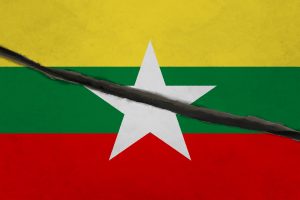Myanmar’s military junta has announced that it will conduct a nationwide population and household census, as a prelude to a long-planned election. Junta chief Senior Gen. Min Aung Hlaing told a meeting yesterday that census data will be collected between October 1 and 15, according to the state-run Global New Light for Myanmar.
In a televised speech later yesterday, Min Aung Hlaing said that the census would provide “correct and accurate population data,” which would be used to “manage present and future development projects.” He added that the census “can be used in compilation of correct and accurate voter lists, which is a basic need for successfully holding a free and fair multiparty democratic general election.” He described this as the “ultimate mission” of the State Administration Council (SAC).
Since seizing power in February 2021, the SAC has promised to hold an election as a means of initiating a transition back to a form of civilianized military rule. However, it has been forced repeatedly to postpone its plans due to the deteriorating political situation across the country.
In August, it extended its initial state of emergency for the sixth time kicking its plans to hold an election back to an unspecified date in 2025. But over the past year, the junta’s battlefield fortunes have gone from bad to worse.
Resistance groups, including ethnic armed groups and People’s Defense Forces, have seized large swathes of territory in Shan, Rakhine, Kayah (Karenni), and Kachin States, straining the military’s fast-diminishing resources and manpower. They are now beginning to make inroads into the country’s dry central plain, which the military has traditionally viewed as a stronghold. Even in the core regions of the central plain, large portions of the countryside remain contested. In May, the Special Advisory Council for Myanmar published a report claiming that the SAC has lost “stable control” over townships covering 86 percent of the country’s territory and 67 percent of the population.
While such claims are hard to verify, the idea that the military could conduct a comprehensive census anytime in the foreseeable future – let alone a legitimate multiparty election – strays into the realm of the fantastical. As things stand, it is clear that the junta probably would only be able to administer a census in a minority of the country, predominantly on the dry central plain and in the major cities like Yangon, Mandalay, and Naypyidaw.
Even then, the process is likely to be attended by significant public suspicion. The National Unity Government, which is coordinating the nationwide resistance to military rule, expressed skepticism that the military government intends to hold an election any time soon and advised people to use “caution” in complying with any census questions, the Associated Press reported.
“If the people give their information to the terrorist organization, it will only use this information to use other methods to terrorize the public,” NUG spokesperson Nay Phone Latt told the news agency, referring to the SAC.
Likewise, even if such an election can somehow be held, it is likely to be rejected as a sham by a majority of Myanmar’s population, as well as the democratic West and many other foreign governments. Dozens of parties – one count puts the total at around 40 – have been disbanded for refusing to register under a tough new party registration law, among them the dominant National League for Democracy, which won a landslide election victory in 2020, just three months before the military coup.
However, there are signs that some of Myanmar’s regional neighbors view an election, however flawed, as a possible opening for a political settlement of some kind. China’s government, to take one example, has offered to support the junta’s election plans. Last month, Chinese foreign minister Wang Yi promised technological assistance for the census-taking process, Reuters reported, citing state media reports.
As things stand, however, even clearing this low bar – staging an electoral exercise designed to ratify a form of camouflaged military rule – is likely to be an uphill struggle.
































